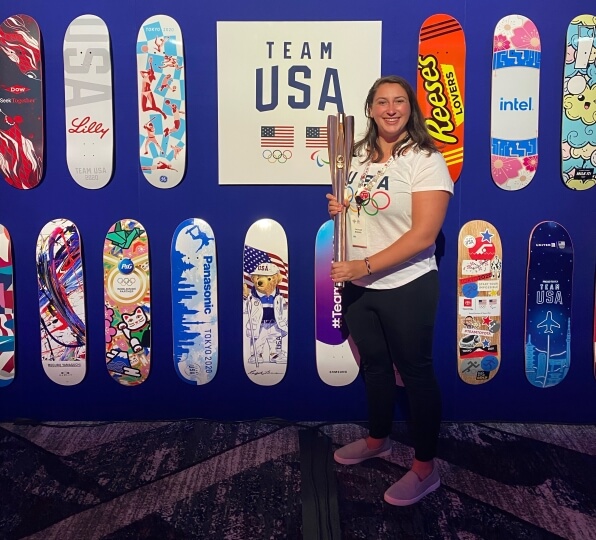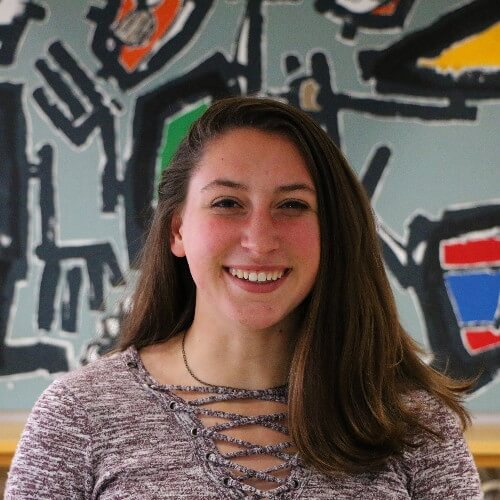Caitlin Weigel, A.B. ’19, at a Team USA Friends & Family event during the Tokyo Olympics.
Going into her final year at Harvard, Caitlin Weigel wasn’t sure where her career would take her. A key member of the Crimson women’s rugby team, Weigel had often focused on athletics during the summer, a time when many of her classmates at the Harvard John A. Paulson School of Engineering and Applied Sciences (SEAS) sought internships or research opportunities.
Almost on a whim, Weigel, A.B. ’19, attended a sports analytics conference during her fourth year at SEAS. Dan Webb, Director of Performance Analytics for the United States Olympic & Paralympic Committee (USOPC), was there, and the two got to talking.
“I love the Olympics,” Weigel said. “At the start of April, Dan reached back out and said they were hiring someone for a four-month project to clean up one of our servers. I was interested, so I did a short application project, and by mid-April I got the job.”
The USOPC turned out to be a perfect fit. Weigel had already planned to move to Denver after graduating because of a strong women’s rugby team there. Now she had a job that would tap into the applied mathematics and data science she studied at SEAS, plus easy access to some of the best training facilities in the country as she continued to pursue her dream of playing for the U.S. national rugby team.
Weigel is currently the manager of qualitative analytics for the USOPC, where she tracks and implements feedback surveys and strategies for the entire organization.
“Qualitative analytics is analytics on data that isn’t strictly numbers,” Weigel said. “We have a lot of partners and stakeholders that we either serve or need to work together with to better serve another group. Our three main stakeholder groups are athletes, national governing bodies such as U.S.A. Swimming or U.S.A. Track & Field, and our own staff.”
Growing up in Hudson, Ohio, Weigel always wanted to leave the state for college. Harvard wasn’t initially on her radar, but during her senior year of high school her family planned a trip to Boston. The Weigels decided to add Harvard to their itinerary, and their tour guide happened to play for the rugby team. That kicked off a short, informal recruiting process, and Weigel was offered a spot in December.
Once she arrived on campus, she quickly discovered applied math was the field she wanted to study.
“I was never much of a hard sciences person, writing papers was never my strong suit either, but I always loved math,” Weigel said. “I did applied math with a focus on government, which wasn’t common. It was really a ‘choose your own adventure’ for me of trying to figure out what government classes would satisfy math requirements, but I was really interested in how we could use math and data analysis to promote a fair democracy.”
Caitlin Weigel, A.B. ’19
Though focused on rugby for her first two summers, Weigel put her data analysis skills into practice following her third year, interning at Travelstart, a travel agency based in South Africa. That would be her only internship experience while at Harvard, but it was enough to show her how to apply what she learned in a professional setting.
“What Harvard did really well was teach me a lot of the theory and concepts around data and math,” Weigel said. “My internship during my junior year was in conjunction with data science classes I was taking down there. That really rounded out my practical skills, which gave me the confidence when I was applying for jobs to not feel like I had impostor syndrome.”
Weigel’s role at the USOPC has continued to grow since her arrival in August 2019. She’s done logistics and operations reporting for both the 2021 Tokyo and 2022 Beijing Games, and eventually created a new position for herself as an analytics fellow.
“It was going to be a two-year fellowship where I’d be a generalist and help out everyone, but in those two years I expected to also find a niche for myself,” she said. “We were an in-house internal consulting team for the USOPC, so if people needed a project or strategic project management, that’s where we’d come in. We took a lot of ad hoc data requests from other people, such as athlete surveys on supplements they were taking that needed to be grouped and categorized.”
Working for the USOPC hasn’t meant getting to see the Olympics in person … yet. Weigel did get to go to official USOPC watch parties for the Tokyo Games, sitting right next to swimmer Caleb Dressel’s family as he won his first individual Olympic gold medals. She’s also worked out right next to track and field athlete Kara Winger, the American record holder in the javelin, among other experiences with some of the United States’ most elite athletes.
The USOPC has proven to be exactly the right spot for Weigel, tapping into everything she learned at Harvard while still allowing her to pursue her athletic dreams.
“Coming out of college, you’re usually like a grunt in your first job,” she said. “You’re not usually in the room with the people making these big decisions, and you don’t always have a chance to influence the strategic priorities of an organization. It’s so cool that I’ve been given this experience and opportunity to not only learn the math side of things, but also the business and strategic thinking skills that are definitely hard to come by for a 25-year-old.”
Press Contact
Matt Goisman | mgoisman@g.harvard.edu

